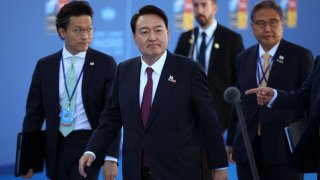South Korea’s Indo-Pacific Strategy: A Ray of Hope or Losing Steam?
South Korea needs to reconfigure its ties with regional like-minded partners beyond North Korean concerns.
The Long and Short: “Pivotal State” Potential Yet to Fructify?
In sum, even as Seoul still prioritizes the United States ahead of the EU among the Western partners in the Indo-Pacific, the economic partnership is emerging as a greater tool for South Korea’s relations with the EU. Moreover, the partnership with the United States has shown chinks, be it due to the stress on South Korea coveting nuclear weapons despite U.S. assurances or the tit-for-tat allegations of spying.
In Asia, South Korea has not gone full steam ahead in enhancing its ties with both ASEAN and India, let alone a new momentum that was expected via new policies that took forward Moon’s New Southern Policy Plus vision; the earlier advancements seem to have also plateaued. Even in multilateral and minilateral platforms, whereas a trading economy, Seoul swings between economic multilateralism (as a member of multiple regional trade deals) and security multilateralism/minilateralism (e.g., the two trilateral including China and Japan, and Japan and the United States and temporary participation in the Quad Plus), a lag is visible.
For example, despite showing interest, there seems to be no movement on the Comprehensive and Progressive Agreement for Trans-Pacific Partnership (CPTPP). However, South Korea’s membership in the Indo-Pacific Economic Framework for Prosperity (IPEF) should help support its industrial supply chain, particularly as it chairs an IPEF crisis network that looks into addressing supply chain disruptions. Vis-à-vis the security platforms, South Korea’s attention is skewed toward the United States-led trilateral, as mentioned earlier.
Considering every regime change in South Korea reconfigures the old policy commitments, the Yoon government only has until 2027 to make a lasting impression on the regional and, in turn, global economic and security order—a tall task as things currently stand. Arguably, South Korea will first need to show its potential as a pivotal state in the Indo-Pacific before it can be considered one beyond the region.
Jagannath Panda is the head of the Stockholm Centre for South Asian and Indo-Pacific Affairs, Institute for Security and Development Policy, Sweden, and a Professor in the Department of Regional and Global Studies at the University of Warsaw. Follow him on LinkedIn and X @jppjagannath1.
Julie Yu-Wen Chen is a Professor of Chinese Studies at the University of Helsinki, Finland, and a Visiting Professor at the Research Institute for Languages and Cultures of Asia at Mahidol University, Thailand. Follow her on X @julieyuwenchen.
Richard Ghiasy is a Senior Fellow at the Leiden Asia Centre at Leiden University and an Expert for the Dutch Government Sinologists Council (CKN) in the Netherlands. Follow him on LinkedIn.
This work is part of a Stiftung Mercator-funded project titled “Order in the Indo-Pacific: Gauging the Region’s Perspectives on EU Strategies and Constructive Involvement.” The views and opinions expressed are those of the authors only and do not necessarily reflect those of Stiftung Mercator or the authors’ respective institutes.
Image: Belish / Shutterstock.com

